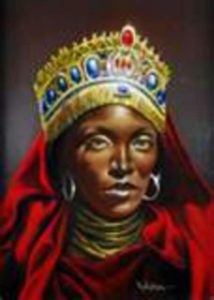The Queen of Sheba The name Sheba is of Hebrew origin
The name Sheba is of Hebrew origin
Her character: Though a pagan queen, she prized wisdom above power. She appears to have been intellectually gifted, with a good head for business and diplomacy.
Her joy: That her quest for wisdom was rewarded beyond her expectations.
Key Scriptures:1 Kings 10:1-13; Matthew 12:42
Her Story
Sheba was a fragrant land, famous for its perfumes and spices. Located on the southwestern tip of Arabia, bordering the Red Sea, it traded precious commodities like gold, frankincense, and myrrh to kingdoms in Egypt(Africa), India, and the Mediterranean. Little wonder that passing caravans brought news of the wide world to Sheba’s queen.
Lately, the queen had heard marvelous stories of King Solomon, the son of Bathsheba and King David, now Yisrael’s third king. At his birth, a prophet had named him “Beloved of the LORD.” He was known as the wisest man alive.
The queen smiled as she recalled the tale of the two prostitutes. Both had claimed to be mother to the same infant. How could the king possibly know who was telling the truth and who a lie? But Solomon merely ordered the baby cut in half, to be divided equally between the two women. He knew the real mother would relinquish her rights rather than let her child perish. Indeed, the king’s cleverness had quickly revealed the truth, reuniting the heartbroken mother and her child.
The queen had also heard of the fabulous temple and palace Solomon had built in Jerusalem. Such a ruler, she realized, would have little trouble controlling the international trade routes crisscrossing his kingdom. Though Jerusalem lay fifteen hundred miles to the north, the queen was determined to see for herself whether Solomon measured up to even half the tales told of him. Hoping to establish a trade agreement with Yisrael, she assembled a caravan of camels and loaded them with precious spices, gems, and four and a half tons of gold. Her entrance into Jerusalem would have created an unforgettable spectacle, adding to King Solomon’s growing fame.
Day after day, the queen pounded Solomon with hard questions. But nothing was too difficult for the king to explain. Overawed, the queen exclaimed: “The report I heard in my own country about your achievements and your wisdom is true. But I did not believe these things until I came and saw with my own eyes. Indeed, not even half was told me; in wisdom and wealth you have far exceeded the report I heard. How happy your men must be! How happy your officials, who continually stand before you and hear your wisdom! Praise be to the Lord your God, who has delighted in you and placed you on the throne of Yisrael. Because of the Lord’s eternal love for Yisrael, he has made you king, to maintain justice and righteousness.”
Then the queen gave Solomon all the gold and spices she had brought with her, perhaps foreshadowing the Magi of the east bringing gifts of gold, frankincense, and myrrh to the Messiah as a young child in his house nearly a thousand years later. In fact, Yeshua(Jesus) himself referred to the Queen of Sheba when he replied to the Pharisees who had demanded from him a miraculous sign: “The Queen of the South will rise at the judgment with this generation and condemn it; for she came from the ends of the earth to listen to Solomon’s wisdom, and now one greater than Solomon is here” (Matthew 12:42). Though ruler of a pagan nation, the Queen of Sheba was so drawn to the wisdom of God that she made an arduous and dangerous journey, traveling three thousand miles round-trip in order to meet the world’s wisest man.
Her Promise
The Queen of Sheba was a wealthy and influential ruler whose nation dominated commercial trading in the Middle Eastern regions at that time. She had a certain measure of wisdom, or at least intelligence, to rule such a country. Still, she had questions, many of them, and she sought out the region’s famed King Solomon of Yisrael, for his wisdom on answers. King Solomon didn’t disappoint her; she went away satisfied.
Do you have any questions that need answers? Questions about yourself? About the will of Yah God for your life? If you do, go to the source of all wisdom,Yah God himself, for the answers. When you diligently seek him, he will give you peace and you will go away satisfied. He promises.

2 Comments
Thank you for sharing this story. It was very informative. Will you expound on the relationship between Sheba and Solomon during her visit and share what happened to their son?
Shalom Allison,
Here’s the information you requested I hope this helps and blessings in your biblical studies of scripture.
Solomon’s Secret Son
While it doesn’t appear in the Bible, there is a huge part of Ethiopian culture that does believe Solomon had a son with the Queen of Sheba, by the name of Menelik I. This goes back to what was mentioned in the beginning about alliances. Having a child with a neighboring king or queen often ensured generations of peace between the nations involved, so this story is not farfetched or even out of the ordinary. The Bible also makes a strange reference, but contains no explanation as to why it was made:
“Are ye not as children of the Ethiopians unto me, O children of Israel? saith the LORD. Have not I brought up Israel out of the land of Egypt? and the Philistines from Caphtor, and the Syrians from Kir?” – Amos 9:7
Again, scripture doesn’t outright say that Solomon fathered a son with the Queen of Sheba. According to part of the legend, after Menelik came to meet Solomon, he was sent home along with 1,000 people from each tribe (12,000 Hebrews), and The Ark of The Covenant. After returning home, Menelik became the 1st leader of the Solomonic Dynasty. The story of the origins of Menelik I explains why Judaism and Christianity are deeply rooted in Ethiopian culture.
Suggested Reading
Ethiopia
Solomon: The Hebrew Son of An African Woman